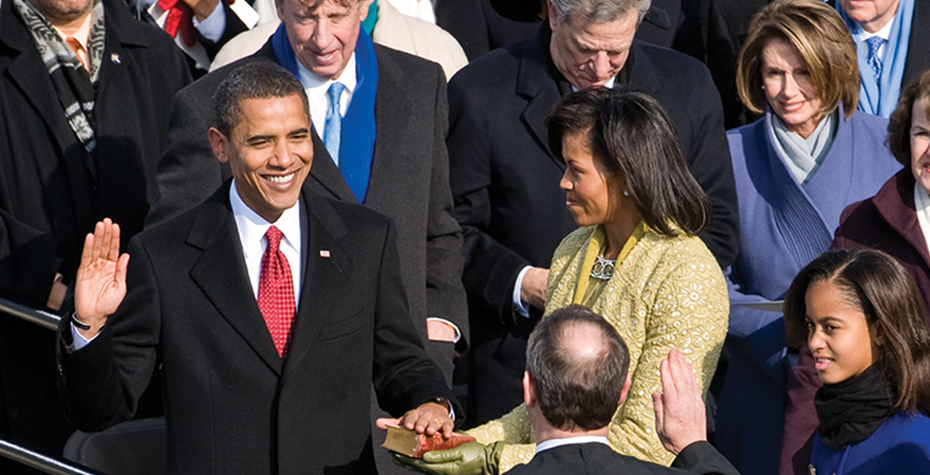New Book by Wellesley American Studies Professor Tackles Race in America

Michael Jeffries, Knafel Assistant Professor of Social Sciences and Assistant Professor of American Studies, studies race, gender, politics, identity, and popular culture. His new book, Paint the White House Black: Barack Obama and the Meaning of Race in America, looks at how race relies on other social forces, like gender and class, for its meaning and impact.
The book features discussions of race and nationhood, discourses of "biracialism" and Obama's mixed heritage, the purported emergence of a "post-racial society," and popular symbols of Michelle Obama as a modern black woman; we asked him about some of those themes.
Your book focuses on “an understanding of how race works in America” rather than emphasizing the details of President Obama’s political career; why is it important for the reader to think about the topic this way?
We need to move away from "great man" or "great woman" explanations for historical change. President Obama is a supremely talented politician, and an important thinker and speaker in many ways, but he operates within all sorts of constraints. Likewise, our impressions of the president are constrained by our cultural context—the language we use, the images we see, and the stories that are amplified by media outlets become the raw material for building our own personal models of Barack Obama. The way we talk and think about race is obviously a major factor in all this, but race is such a contentious and taboo topic that racial discussion is fraught with missteps and misunderstandings. The only way to get a grip on Obama-mania and effectively counteract racism is to force ourselves to think about race in concert with other ideas, like class and gender.
Why do people assume that we’re a postracial society (or how did President Obama’s election encourage this thinking) and is this belief incorrect?
Truthfully, I don't think many people actually believe such nonsense. But the idea of postracialism gained traction during Obama's rise for a couple of reasons. First, there is the notion that making it to the White House represents the final hurdle for any disparaged group working toward integration or equality, and after that happens, there is nothing left to be done and no need to worry about racism. Obviously, this is untrue—it takes hard work, privileges, and luck for a candidate to be in such a position, and people without such privileges and luck face a host of race-related challenges, depending on how race intersects with class, gender, religion, etc. Second, "postracial" became a buzzword for a new generation of nonwhite politicians who use campaign strategies and styles of self-presentation that do not look like their predecessors'. So the "post" in "postracial" or "postblack" politics refers to the period of time after the civil rights movement, when the new generation was forged. I argue that while Obama is often cast as an inventor or innovator on this front, he is certainly not alone, and "postblack" politics is less about style and personality than it is about the way black political institutions have changed over time.
Another topic you explore looks at “popular symbols of Michelle Obama as a modern black woman." What are a few of the portrayals you've observed and their significance?
Michelle Obama is repeatedly subject to all the classic racist and sexist stereotypes of black womanhood. But one of the newer representations that I focus on in the book is her status as an uber-successful and seemingly invincible superwoman. As a number of scholars have pointed out, this portrayal seems like a compliment on the surface, but it can mask the disadvantages and insults that she and so many women of color have to fend off every day. I highlight a key piece of this newer representation in Michelle Obama's case—the narrative that because the first lady has "made it," she has no right to complain about anything. Whenever Ms. Obama is the slightest bit critical, and even when she is not, she is cast as "ungrateful," or "uppity," to use a more historically grounded and racist term for blacks who don't "know their place." To her credit, the first lady has handled all of this with remarkable grace, and responded with a politics of self and familial love that directly counters the logic at the core of all the insults lobbed her way.
Michael Jeffries
At Wellesley, Jeffries teaches courses on race and politics, and the sociology of sports as well as advanced seminars for third- and fourth-year students on Barack Obama and hip-hop studies.
Paint the White House Black: Barack Obama and the Meaning of Race in America is available now from the publisher, Stanford University Press, and can be pre-ordered from Amazon (print or Kindle) or Barnes & Noble for delivery in February. Jeffries’ non-academic writing can be found on The Atlantic and The Guardian. You can follow him on Twitter @M_P_Jeffries.
